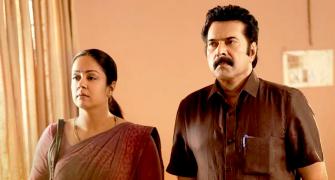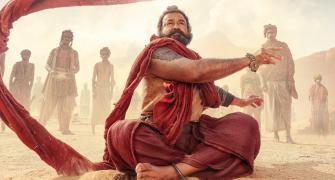The reasons are too private to be discussed at a round table, listed out during a seminar, or uncovered in an academic course.
A proud but insomniac connoisseur murmuring in his sleep may do a better job of explaining the phenomenon than an expert on a podium.
Sreehari Nair airs his thoughts.

The father of Malayalam cinema was also a fencing and Kalariyipattu enthusiast, and the first showing of his first film generated as much ruckus and stampede as it did applause and whistles.
Like the fate of that film (now 'lost'), pathos has forever accompanied our cinematic celebrations.
A collective sigh runs through our happiest reels. Bellicose and Belles-lettres hang together.
Fiction is an excuse to give the mundane its due

To those who want their plots perfectly diagrammed and pursued, our films may seem 'slow'. But look closely and there's always something happening, the comedy and poetry of everyday life seamlessly entwined.
There's a Malayali man with his pole and sickle trying to fell a jackfruit; watch how the camera pauses to underscore his exaggerated crouch.
There's a Chechi's suddenly contorting face that reminds you she has been wringing a petticoat into submission.
I can present you with scene after scene of our characters squeezing out with distracted relish the insides of drumsticks.
Suspense is nicely browned, too.
A staring match makes for a genuine moment of tension in our movies, and our veiny hands have the freedom to deliberate over chess coins before finally making a false move.
Where pratfalls strike a different note

There was a time when our left-wing theatre and Kathaprasangams seemed more alive than our matinees.
There was a period when the gap between our celluloid weepies and our tele-serials seemed to be closing by the day.
There was a phase when we had grown too precious about our houseboats, our Tharavads, and our innocence, as exemplified by balloons and paper windmills.
The truth of the matter is that many of our tepid movies have gone on to clock great box office numbers, and a sizeable chunk of our masterworks were made in an age of indifferent cash registers. Our true failures are those instances when we have chosen neat assembly-line structures over the complexities of life, when we have privileged 'order' over 'chaos.'
Those little things that the subtitles fail to translate

Since petulance (unlike swearing) cannot be regulated by the Censor Board, we let it colour our on-screen discourses. It's typically with a low grumble, a faint strain of back answer, and a semblance of irritation that our movie characters converse with one another.
This passion for out-speaking whoever's at the lectern, for sneakily revolting against whoever's in authority, you may follow throughout our cinema.
In our movies, children can be seen searching for Lucky Red Seeds even after the last call for evening prayers has been sounded.
We know now that persistent cleverness in wit can be exhausting

The history of Malayalam cinema pivots around the discovery that our wit holds great cinematic potential.
Since then, the humour in our movies has seen two phases. Our movies have shifted from trying to be funny all the time and making cracks in legible locutions to the juxtaposition of many voices and the accommodation of voices not yet heard.
'Punchline-brewing on the far side of comfort zone' is a valid topic of study in our movies right now.
The Central Travancore guy who feels like a Martian in arid Kasargod evokes universal titters.
To the present-day screenwriter, few things are funnier than a native Keralite comprehending in real time that the migrant Bengali worker has absorbed not just a Malayali's gift for verbal one-upmanship but also his snark.
Our constraints work to our advantage

It's true that because our budgets tend to be small, we are forced to build imaginatively.
In the old days, when our storylines contained wedding sequences, our actors would themselves prepare the Sadya, haul in the cornices and put up the paneling, as well as think of how to decorate the marital bed, so that 'production design' and 'living as characters' became almost indivisible.
It was during the making of one of our most measly-budgeted pictures that something of 'civilisational' proportions was attempted: Aravindan's Oridathu, an art-house classic, had taken upon itself the task of demonstrating how an entire village is electrified.
Just as showmen in puritanical times would think up creative ways of showing smut, our muses are stimulated into zealous activity every time we get into a jam.
It's my firm belief that if Joji had been a big-budget production, that eerie-looking pond in the movie would never have been conceived.
Money: A 'not-good-enough' bait

Commercial success corrupts us too, and yet absolute commercial success does not seem to corrupt us absolutely.
That is to say, even the Chateau-owning, Cognac-and-Caviar-guzzling mainstream Malayalam film-maker craves the uncompromising film-maker's courage to risk failure, envies his monastic lifestyle, wishes for his understated class.
Every time Plutus and Apollo square off in Kerala, it's Plutus who willingly beats a retreat.
This is why, unlike in other southern states, our most promising film-makers do not wind up as house-pets of our superstars. Or, to put it in less graphic terms, our superstars do not sign on promising film-makers so as to destroy their originality.
Our outlaw stays indoors

We have our version of the outlaw but he happens to be a homebody.
He's the man on the armchair at the verandah.
Devoted to his fixed schedule, showcasing a special fondness for the obituary section in the newspaper, set in his ways, the man on the armchair warms his derrière right up on the screen.
When approached for directions, he either looks away or offers vague responses.
Though born in the laboratory of Adoor's mind and given his first hint of blood and bones by Karamana Janardanan, both Mammootty and Mohanlal have played interpretations of this rather romantic figure. He is indigenous to our land, the feudal lord well past his glory days, brandishing with equal felicity sometimes the rifle and sometimes the spittoon.
On the question of tackling raw subjects head-on

If dressing up your lust for empty violence in some social cause is an art, then it's fair to say this art is lost upon us.
In our cinema, the price of 'sensitisation' is not something as extreme as graphic police torture scenes: A simple shot of a man walking out of a lock-up with a limp does it for our audience.
It must also be stated that our movie posters hardly ever advertise daggers dripping with the blood of 'oppressors' nor do they vouch for such novelties as the taciturn hero who stands Odysseus-like amid a sea of corpses after the fight against drugs has been won.
I don't know about my comrades but it's a matter of immense pride for me that in Malayalam cinema, we continue to recognise psychotics... as psychotics.
The curtain falls on a dream. Is it possible to sum up our aesthetic in just a sentence?

Oh yes, that would be: 'Our mothers cry in wide shots, and our cows ruminate in close-ups.'










